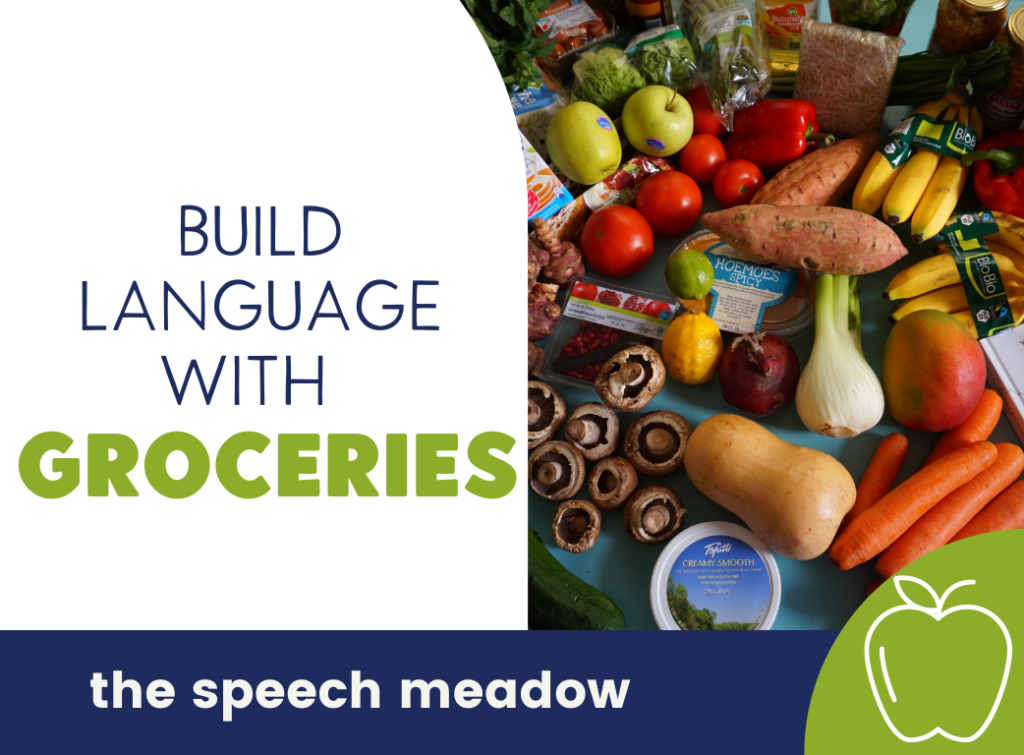Last post I talked a little about how you can use laundry to help language development, (click here). This time I would like to talk to you about the many ways you can use groceries to build language skills.

Most parents want activities to do at home with very little set up and groceries fit the bill. Now don’t get me wrong, this is by no means a time saver on your household chores. This will, in fact, add time and perhaps a little chaos to your day. My recommendation is to pick one and try it out. Try and keep your child’s language level in mind. Some of these may not be suitable for your child at this time. Make it fun and the children will improve their language skills and learn personal responsibility all in one!
1. Talk about where things go by using location words (prepositions): Often children with language delays have troubles understanding and using prepositions. Use words such as top, middle, bottom, next to, beside and/or under when the children are putting the groceries away. Alternatively, have the children tell you where they put the groceries. E.g. “It goes on the top shelf of the fridge.”
2. Talk about the word together: This is another way to talk about where food goes or what group (category) it belongs. E.g. “The beans all go together.”
3. Talk about same or different: Not only is this important vocabulary but also an important math skill. E.g. “The black beans are all the same but the tuna is different.” or “The tuna and the black beans don’t go together they are different.” Alternatively, have the child state if two foods are the same or not.
4. Talk about cold, frozen, warm and hot: This is great to do when you are putting the groceries away. Being able to experience the vocabulary your are trying to teach them is very important but as always you want to keep them safe!
5. Talk about heavy and light: When putting the groceries away talk about their weight. Have your child pick them up and have them talk about if they think it’s heavy or not.
6. Have your child sort by category: I’ve already touched on this one a little but have your child sort in a variety of ways (e.g. fruits v. vegetables, breakfast v. supper etc…) Alternatively, group the food and have your child try to name why they are sorted that way.
7. Use words such as not and doesn’t: These again can be tricky words to understand. Pretend to put the groceries away wrong and then talk about it. “Oh! That doesn’t go in the fridge!” It is important for children to see that everybody makes mistakes and how you can try again and fix it.
8. Play “I Spy”: At home or in the grocery isle, describe food and have your child try to find it (e.g. I’m looking for a vegetable that is small, round and green.) Alternately, have your child describe the food and you try to find it.
9. Following Directions: Make a game out of putting the groceries away. You can make them “serious” (e.g. take the lettuce and the cucumbers and put them away.) or you can make them “funny” such as “take five oranges, hop to the fridge and put them away.” Alternately, have your child give you the directions. What kid doesn’t like bossing their parents around?
10 Build in pre-reading skills: Have your child help make the list of food that you need. Cut out (or have them do it) pictures from flyers or images off the internet and glue them to the list. Add written words beside the pictures. Then have your child check them off as you put them into the cart. You could also make them a list of items for them to put them away.
And as always, I can never stop at ten so here is one more.
11. Try a new foods: Let your child pick out something new at the store. Talk about how it tastes, if they like or not and why?
If you would like to know about how chores can help children’s development, go here. If you would like a handout on how to use laundry to develop language skills, go here. For other handouts on building language with a variety of life skills, check these handouts outs.
I hope you enjoyed reading this and if you have any other ways to add language into grocery shopping I would to hear about them!

One Comment